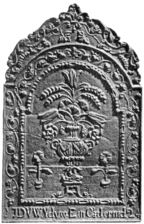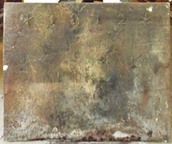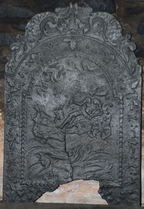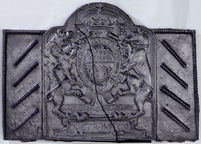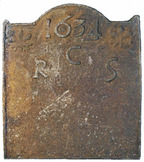-
941
Description: Arched rectangular shape; scalloping within wide fillet edging; shield, knight's helm, crest and mantling; date split either side of armorial.
Notes: The arms are of Kyrle (vert, a chevron between three fleurs de lys or; crest: on a mount vert a hedgehog or) of Much Marcle, Herefordshire, quartered with Abrahall (azure three hedgehogs or; the fess appears to be erroneous) and Warnecombe (sable, on a fess dancetty argent between three bezants each charged with an escallop of the field as many lions rampant argent armed and langued gules). The second part of the date appears to have been altered by hand for the present casting as the style of lettering for the final two numerals is crude compared with the first two. Sir John Kyrle may have operated the iron furnace at Whitchurch, between Monmouth and Ross on Wye; the style of the carving is the same as on two other firebacks in the same county. It is apparent, from another example, that this fireback has either been broken and repaired, or deliberately reduced in height. Originally the mantling of the helm extended further down, ending in tassels on each side, making the height of the fireback approximately equal to its width. An early photograph of the Fawley fireback, taken by Alfred Watkins, the Herefordshire antiquarian, shows the division of the two parts more clearly (Herefordshire Record Office, AW339b). A copy of the original, un-reduced fireback has been noted with the date 1685 in the distinctive numerals seen on firebacks from Flaxley Furnace, Gloucestershire.
Copies of this fireback are known.
Inscription: 16 20
Arms: Kyrle quartering Abrahall and Warnecombe
- Decoration tags:
- rectangular with round arch (shape)
- fillet with scalloping (edging)
- whole carved pattern
- individual numbers
- armorial
- text
Manufactured: in 1620 possibly at Whitchurch Furnace in the Herefordshire area of England.
Current location: in private hands, Fawley, Herefordshire, England.
- Attached to series:
- Personal armorial firebacks
- Herefordshire armorial series
-
858
Description: Arched rectangular shaped central panel, bead-and-pellet on fillet edging, narrow-necked, two-handled urn with flowers and wheat ears issuing therefrom, the vase resting on paving, upon which are two small flowers in pots with a stool between; arched rectangular shaped border with fillet edging and symmetrical floral tendrils, a looped 'W' in each shoulder; on top, mirrored leaves, tendrils and wheat ears; inscription along bottom of border.
Notes: One of the two largest of six flower vase designs in this series (see also no. 885). All incorporate the looped 'W' motif which may be intended to identify the pattern maker. The inscription translates as 'God is our strength'. Illustration from Goodwin-Smith, 1936 (from Bratt Colbran Ltd.'s (London) catalogue, in which copies of this fireback were advertised in the early-20th century).
Copies of this fireback are known.
Inscription: 17 DVW Ydyw Ein Cadernid 24
Manufactured: in 1724 in England.
Current location: not known.
Citation: Goodwin-Smith, R., 1936, 'Some English Firebacks', The Connoisseur, 97, pp. 36-8.
- Attached to series:
- 1724 series
- Welsh inscription series
- British 'Dutch' style firebacks
-
1127
Description: Plain rectangle; no edging; top centre, date between two six-pointed stars.
Notes: Characteristic of the last firebacks cast at Ashburnham Furnace, Sussex. One of a small series of firebacks cast in the early-19th century for farms on the Ashburnham estate.
Inscription: * 1812 *
- Decoration tags:
- rectangular (shape)
- none (edging)
- carved stamps
- individual numbers
- text
- objects
Manufactured: in 1812 at Ashburnham Furnace in the Weald area of England.
Current location: not known.
- Attached to series:
- Date only firebacks
- Ashburnham late series
-
698
Description: Arched rectangular central panel with nutshell edging on a broad fillet; pictorial scene of a figure in a chariot drawn by birds, above a ground, and with clouds over; arched rectangular border with fillet edging; alternating acanthus leaves with swirled tendrils; on top, two mirrored sea serpents.
Notes: Similarities in the design and execution of the pattern suggest the work of the pattern-maker identified as ‘N’.
- Decoration tags:
- 'Dutch' (shape)
- fillet (edging)
- whole carved pattern
- pictorial
- mythological
- animals
- humans
- objects
Manufactured: in the early-18th century in England.
Current location: Sulgrave Manor, Sulgrave, Northamptonshire, England.
- Attached to series:
- British 'Dutch' style firebacks
-
768
Description: Arched rectangular shape with rounded corners; ovolo within fillet moulding all round; oval Tudor royal shield with garter surrounding, topped with a royal crown; dragon and greyhound supporters; initials split by crown; inscription on a fillet between legs of supporters, behind garter finial; motto on an Ionic plinth at bottom; two rectangular side panels with twisted rope edging top and side; a short length of turned dowel stamped four times, diagonally, on each panel.
Notes: The supporters are those of Henry VII or Henry VIII, but the initials suggest the fireback dates from the reign of Edward VI (1547-53). John Harvo (d. c1565) was a gunfounder who has been identified as occupying Pounsley furnace, Framfield, Sussex, possibly from as early as 1547; the fireback may have been cast originally during the reign of Henry VIII (1509-47), with the initials added to an early casting using the original pattern. The disparity between the worn surface of the armorial panel and the greater clarity of the extensions indicates that the extended casting was made using an already well-used armorial fireback and therefore at a substantially later date.
Copies of this fireback are known.
Inscription: E R / HONY SOIT QVE MAL Y PAYNCE / Made in Sussex by John Harvo / DV ET MOVN DROI
Arms: Tudor royal - Probably Henry VIII
- Decoration tags:
- rectangular with round arch (shape)
- rope (edging)
- carved stamps
- whole carved pattern
- individual letters
- extension panels
- armorial
- royal
- text
- objects
Manufactured: in the late-16th century in England.
Current location: Victoria & Albert Museum, Cromwell Road, Kensington & Chelsea, Greater London, England.
Museum number: 685.1899 (part of the Victoria & Albert Museum museum group)
- Attached to series:
- Pounsley series
- John Harvo series
-
1055
Description: Arched rectangular shape with small triangular protrusions in each top corner; fillet edging (top and sides); top centre, date stamp, over-pressed on right side; top corners, single fleur-de-lys stamp; below date, initials in triad.
Notes: The fleur-de-lys is of a distinctive form; the small triangular protrusions are not seen on other firebacks. Wilkinson's, Doncaster, auction 26 Feb 2017 lot 272. A fireback with the same date stamp is at Newark Park, Ozleworth, Gloucestershire.
Inscription: 1634 / RCS [triad]
- Decoration tags:
- rectangular with round arch (shape)
- fillet (edging)
- carved stamps
- individual letters
- date stamp
- heraldic
- text
Manufactured: in 1634 in England.
Current location: not known.
- Attached to series:
- 1634 stamp series

